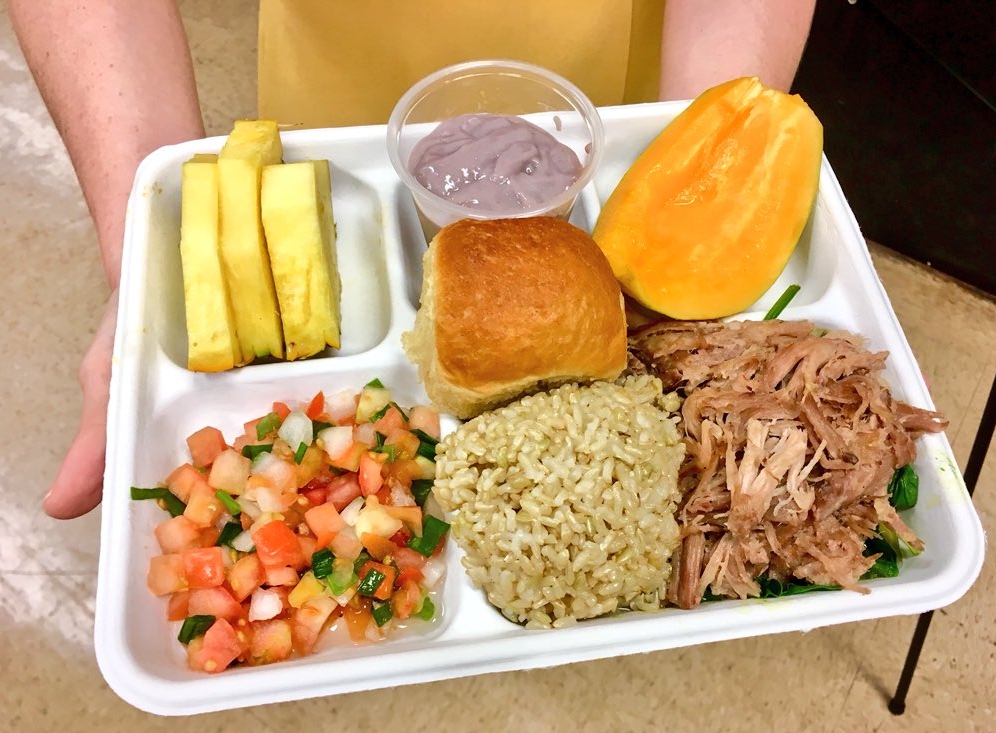Big Island ‘Aina Pono Farm-to-School Pilot Program Expands
Students at Mililani High School on O‘ahu celebrated the state’s ongoing ‘Aina Pono Farm to School Program on Thursday, March 29, 2018.
Nearly 3,000 meals are prepared in the school cafeteria and also delivered to the students at Mililani Uka and Mililani Waena Elementary Schools.
The program launched in the Kohala School complex on the Big Island, where the school cafeteria became more efficient by reducing and replacing canned, processed food with fresh, locally-grown fruits, vegetables and beef.
https://www.facebook.com/BigIslandNow/posts/1608639385880271
The Kohala complex continues to purchase locally-grown ingredients directly from its community farmers and ranchers to provide students healthier meals.
Lt. Gov. Doug Chin hosted the event to update public and private partners about the program. They included Senate President Ron Kouchi, Mililani Sen. Michelle Kidani and Hawai‘i State Department of Education Senior Assistant Superintendent and Chief Financial Officer Amy Kunz.
Lt. Gov. Chin commended everyone at Mililani High School for embracing the ‘Aina Pono program.
“The students and administration of Mililani High School give ‘Aina Pono high marks,” said Lt. Gov. Chin. “They’ve tasted the difference and their excitement for this fantastic program is overflowing to other schools. It’s exactly what we envisioned when the Farm to School Initiative began. Because this program is pono, students at other schools are demanding it.”
Students want the food choices that the ‘Aina Pono Farm to School Program is providing. As symbolized in the logo, unveiled today, March 29, the program brings local agriculture into school cafeterias, and in the process, educates students and school administrators about the undeniable taste and value of fresh, locally grown food versus canned, processed food.
“Studies have shown improved nutrition enhances academic performance,” said Senate President Ron Kouchi. “‘Aina Pono is a great example of a public private partnership that benefits our keiki and makes our schools more efficient.”
“I’m glad ‘Aina Pono is thriving,” said Mililani Sen. Michelle Kidani. “I went to Kohala and saw with my own eyes how students and staff responded to meals made with local beef and fresh produce. That’s why I wanted Mililani High School to take on this life-changing program to show the state that scratch cooking with local ingredients is possible if we re-evaluate school menus and the way we currently purchase.”
That “can-do” attitude has transformed ‘Aina Pono into a movement, especially among students. Like food critics, they can make or break menu choices simply through word of mouth, but the positive reputation of ‘Aina Pono is spreading to other schools.
“Many of my friends wish Mililani was their school,” said Alyssa Ann Yamada-Barretto, Mililani student president. “Who wouldn’t want fresh, locally grown fruits, vegetables and beef instead of processed canned food?”
“Clearly, we can see how far the ‘Aina Pono Farm to School Program has come,” said Hawai‘i State Department of Education Senior Assistant Superintendent Amy Kunz. “But ‘Aina Pono could not have accomplished all that it has since 2015 without the many generous organizations and state department personnel that have kept this program afloat.”
Private funders include: Ulupono Initiative, The Kohala Center, HMSA Foundation, Johnson Ohana Charitable Foundation, Kaiser Permanente, The Dorrance Family Foundation, and Hawai‘i Appleseed Center for Law and Economic Justice.
“I want to thank Lt. Gov. Chin and former Lt. Gov. Shan Tsutsui for steering the ‘Aina Pono ship with a steady and supportive hand,” said Fred Murphy, Mililani High School Principal. “As an administrator, I know it’s not always easy to bring everyone to the table, to convince them that their opinions count. ‘Aina Pono is worth fighting for and I urge other principals to bring it to their students.”
Members of the Mililani High School Student Senate are also championing the ‘Aina Pono Farm to School Program. They even formed a task force to ensure it grows into a sustainable and regular state program without having to rely on private money.
To show their support, students placed posters throughout their cafeteria where Lt. Gov. Chin served a special meal to students and stakeholders.
For the first time ever, kalua pig prepared in a state-approved imu was served to students.
Sponsored Content
Comments










